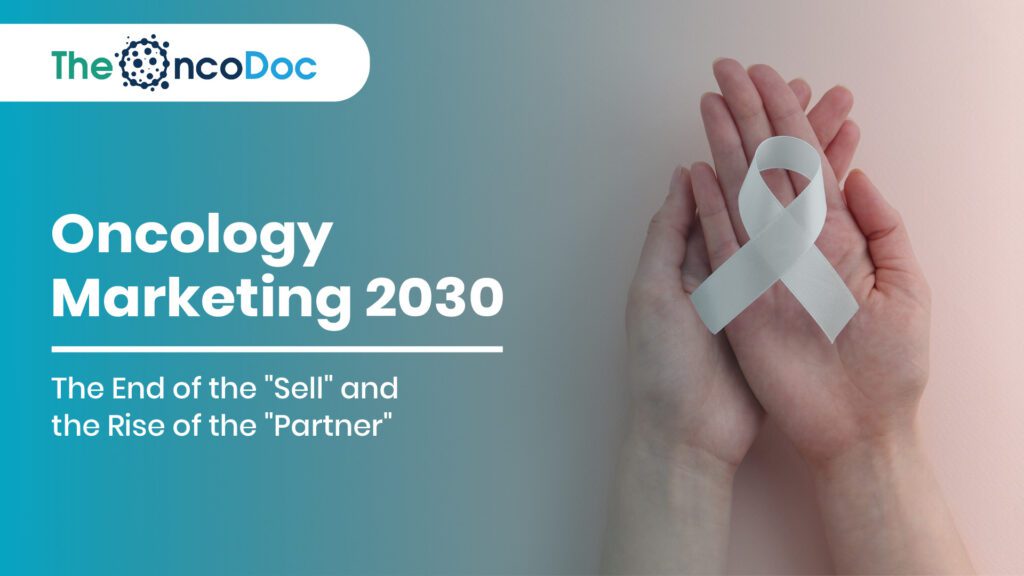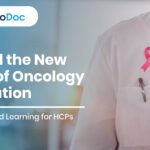Abstract
The year 2030 will mark a fundamental paradigm shift in how pharmaceutical companies engage with oncologists in the US. The era of push-based, product-centric marketing, defined by the sales rep visit, sponsored dinner, and one-size-fits-all digital campaigns—is obsolete. As AI becomes deeply embedded in every facet of the healthcare ecosystem, from drug discovery to clinical decision support, oncologists will demand more from pharma. They will no longer passively consume information; they will expect an intelligent, personalized, and seamless flow of insights and resources that directly enhance their clinical practice and benefit their patients. This article outlines a future where pharma’s role evolves from a transactional vendor to a data-driven partner in patient care.
We will explore five key expectations and how AI will enable pharma to meet them: 1) The Expectation of Predictive Insights, Not Just Product Data; 2) The Demand for “Just-in-Time” Learning within the Clinical Workflow; 3) The Need for a Seamless, Omnichannel Experience; 4) The Mandate for Ethical, Transparent AI; and 5) The Desire for a Co-Created Scientific Partnership.
This analysis is designed for pharma managers, offering a strategic roadmap to prepare for a future where marketing is no longer a department but a foundational capability. By 2030, the most successful oncology brands will be those that have leveraged AI to build trust, demonstrate genuine value, and become an indispensable part of the oncologist’s daily practice, providing the intelligence and support needed to navigate the increasingly complex world of cancer care.
Introduction: From the Information Age to the Intelligence Age
The past decade saw the pharmaceutical industry grapple with the challenges of the digital age. Marketers built websites, launched social media accounts, and created email campaigns, often replicating old models on new platforms. The result was a fragmented, noisy, and often impersonal digital experience that failed to truly resonate with busy oncologists. Meanwhile, AI was quietly revolutionizing drug discovery and clinical research, creating a chasm between a tech-enabled R&D arm and a commercial team still operating on analog principles.
By 2030, this chasm will have closed. AI is no longer a future-facing concept; it is the fundamental operating system of modern healthcare. Oncologists are using AI-powered tools for everything from analyzing radiological scans to personalizing radiation therapy. They have grown accustomed to intelligent systems that provide real-time insights and anticipatory support. As a result, their expectations of pharma have been recalibrated. They will not tolerate generic messaging or siloed engagement. They will demand a level of intelligence and personalization from pharma that mirrors the technology they use in their own practice. This is the “post-AI era” for oncology marketing, and it requires a complete re-evaluation of how pharma defines and delivers value.
Expectation 1: Predictive Insights, Not Just Product Data
The Problem
In 2025, pharma marketing largely remains reactive. A new drug receives FDA approval, and marketing teams create a campaign to educate oncologists on its efficacy and safety. The information is valuable, but it’s a static “data push.” Oncologists, in turn, must manually integrate this new information into their existing knowledge base and patient workflow. This process is inefficient and prone to human error, especially in a field where new data emerges daily.
The 2030 Doctor’s Expectation
By 2030, oncologists will expect pharma to move beyond presenting raw data to providing predictive, actionable insights. They will expect AI-powered systems that anticipate their needs and deliver the right information at the perfect moment.
- Anticipatory Data Delivery: Instead of a mass email about a new therapy, an oncologist will receive a notification from a pharma-supported, compliant platform that says, “Dr. Smith, based on your practice’s patient demographics and recent prescribing patterns for metastatic melanoma, our AI predicts your next patient might be a candidate for our new BRAF/MEK inhibitor. Here is a 90-second video summary of the Phase 3 data for this patient population.”
- Real-World Evidence (RWE) in Context: AI will integrate and analyze vast amounts of RWE (from EHRs, wearables, and genomic data) to provide a dynamic view of how a therapy performs in specific, real-world patient subgroups. An oncologist will expect to see not just the trial data, but a visual dashboard showing how the drug performs in patients with specific comorbidities or those in a particular geographic region.
The AI Enabler
AI, acting as a central nervous system, will synthesize disparate data points to create a comprehensive view of the oncologist’s practice and informational needs. It will connect the dots between a doctor’s digital footprint, their patient population, and their educational preferences to deliver a truly personalized and anticipatory experience.

Expectation 2: “Just-in-Time” Learning within the Clinical Workflow
The Problem
The traditional model of CME involves an oncologist taking time away from their practice to attend a conference or watch a long webinar. While these formats still hold value, they are not integrated into the high-speed, demanding rhythm of a busy clinic. This “learning-in-isolation” model is inefficient and a major barrier to adoption.
The 2030 Doctor’s Expectation
In 2030, oncologists will expect learning to be seamlessly integrated into their clinical workflow. The most valuable educational content will be the kind that helps them make a decision in real time, not one that requires a scheduled appointment.
- Integrated Decision Support: As an oncologist prepares to see a patient, a pharma-developed AI tool, integrated with the EHR, will provide a “decision support brief.” This brief will summarize relevant guidelines and highlight new treatment options, complete with links to micro-learning videos or interactive case studies—all delivered at the point of care.
- AI-Powered Summaries: When a new study is published, an oncologist won’t have to read the full 30-page paper. They will expect an AI-generated, one-page summary from pharma, with key findings and a direct link to the data, delivered to their mobile device or professional portal.
The AI Enabler
AI will act as a learning “co-pilot,” anticipating an oncologist’s needs at the point of care. Natural Language Processing (NLP) will summarize complex scientific literature into digestible formats, and machine learning will match the right content with the right clinical context, making learning an organic part of the day, not a separate task.

Expectation 3: A Seamless, Omnichannel Experience
The Problem
Today, pharma engagement is often fragmented. An oncologist may get an email, a visit from a sales rep, and an ad on a professional website—all from the same company, but each interaction is siloed and unaware of the others. This leads to a disjointed, repetitive, and frustrating customer experience.
The 2030 Doctor’s Expectation
By 2030, oncologists will expect a single, unified, and intelligent omnichannel experience. Their interactions with pharma will feel like a continuous, coherent dialogue, regardless of the channel.
- Personalized “Next Best Action”: AI will track all engagement touchpoints (website visits, video views, sales rep interactions, conference attendance) and recommend the “next best action” across channels. If an oncologist viewed a webinar on a specific therapy, the AI will tell the sales rep to follow up with a highly specific question on that therapy, or it may trigger a personalized email with a related resource, rather than sending a generic promotional blast.
- Dynamic Content Delivery: A single landing page on a pharma website will dynamically change its content based on the oncologist’s profile. An academic oncologist might see content on clinical trial design and translational science, while a community oncologist sees practical guidance on patient selection and adverse event management, all from the same URL.
The AI Enabler
AI serves as the central orchestration engine. It breaks down the silos between different channels and departments, providing a unified view of the oncologist’s engagement journey. It’s not just about a CRM; it’s a learning system that adapts and optimizes in real time to create a personalized journey.

Expectation 4: A Mandate for Ethical, Transparent AI
The Problem
As AI becomes more prevalent, so do concerns about data privacy, algorithmic bias, and transparency. In the highly sensitive field of oncology, where patient lives are at stake, doctors are deeply wary of any system that could compromise patient data or introduce bias into clinical decision-making.
The 2030 Doctor’s Expectation
In a post-AI era, oncologists will not just tolerate AI; they will demand that pharma’s AI solutions are transparent, ethical, and built with integrity. They will expect to see an “ethical AI score” or a “data provenance badge” on pharma’s digital tools.
- Explainable AI (XAI): Oncologists will not accept a “black box” algorithm that provides a recommendation without showing the reasoning. They will expect Explainable AI that transparently shows the data sources, weights, and logic behind a recommendation. For example, a tool recommending a specific therapy will show the key clinical trial data and patient factors that led to that conclusion.
- Data Security and Privacy: With the increasing use of patient-level data, oncologists will expect clear and uncompromised security protocols. They will need assurance that their patients’ data is anonymized and that the AI is used to improve care, not just to sell products.
- Bias Audits: Oncologists will expect pharma to be transparent about its AI models’ biases, showing how the algorithms were trained to ensure they are equitable and do not favor one demographic or patient group over another.
The AI Enabler
AI itself can be used to audit and ensure ethical practice. AI models can be built with explainability as a core principle, and data governance systems can use AI to monitor for compliance and privacy violations. For pharma, ethics will no longer be a checkbox; it will be a core competitive advantage.

Expectation 5: A Co-Created Scientific Partnership
The Problem
The traditional relationship between pharma and oncologists has been largely hierarchical, with pharma as the source of information and the oncologist as the recipient. This model is outdated in a world where clinicians are generating vast amounts of real-world data and are increasingly involved in scientific co-creation.
The 2030 Doctor’s Expectation
By 2030, oncologists will expect pharma to treat them as scientific partners, not just customers. They will want to be part of the conversation, not just the audience.
- Collaborative Platforms: Pharma will provide AI-powered platforms where oncologists can submit anonymized case studies, pose questions, and contribute to research. AI will analyze this unstructured data, identify emerging trends, and use those insights to inform future R&D and clinical trial design.
- Personalized Research Feeds: Instead of a generic alert for a new study, an oncologist’s professional portal will provide a personalized feed of research abstracts based on their clinical interests, co-authored papers they’ve published, and ongoing clinical trials they’re a part of.
- Facilitating Peer Networks: AI will connect oncologists with similar interests or challenges, creating compliant digital communities that facilitate peer-to-peer knowledge exchange. Pharma’s role will be to provide the platform and ensure its integrity, not to control the conversation.
The AI Enabler
AI can act as a bridge between the research community, the clinical community, and the patient community. NLP will analyze unstructured text from forums and case studies, identifying trends and insights that would otherwise be lost. Machine learning will match oncologists with shared interests, fostering a more collaborative ecosystem.

Conclusion: The Future Is Not Just Digital, It’s Intelligent
The oncology landscape in the US is on the cusp of a profound transformation, driven not just by new drugs but by the intelligent systems that will deliver them. For pharma managers, the year 2030 is not a distant forecast; it’s a strategic deadline. The doctors who will lead cancer care in the next decade will not be swayed by mass marketing campaigns or fragmented digital efforts. They will be won over by a brand that understands their practice, anticipates their needs, respects their time, and earns their trust through genuine, data-driven partnership.
The future of oncology marketing is not about selling a product; it’s about providing the intelligence that helps oncologists save lives. By embracing AI as a core capability, and by focusing on predictive insights, “just-in-time” learning, seamless omnichannel experiences, ethical transparency, and true scientific partnership, pharma can secure its place at the forefront of cancer care, building relationships that are not just effective, but essential.
The Oncodoc team is a group of passionate healthcare and marketing professionals dedicated to delivering accurate, engaging, and impactful content. With expertise across medical research, digital strategy, and clinical communication, the team focuses on empowering healthcare professionals and patients alike. Through evidence-based insights and innovative storytelling, Hidoc aims to bridge the gap between medicine and digital engagement, promoting wellness and informed decision-making.



